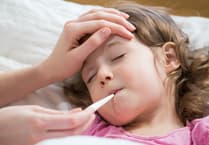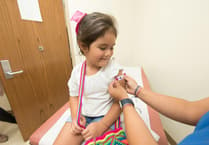DEVON Freemasons has reached the milestone of 75,000 teddies given out to children with the Teddies for Loving Care (TLC) appeal.
The appeal started in the Province of Essex in 2002 after an allergic reaction suddenly caused a swelling and blocking of the windpipe to the wife of Ian Simpson, a Freemason.
Her life was saved by the rapid action of the medical staff at an A and E unit, who was able to resuscitate and stabilise her.
W Bro and Mrs Simpson were, and are both eternally grateful for the swift and caring attention she received, but found the experience the most frightening of their lives and speculated on the distress that children must face when visiting A and E units.
The idea of doing something useful for medical staff at the units was discussed with other local Freemasons and from that point the idea of Teddies for Loving Care was born.
The appeal has since been adopted by most of the Masonic Provinces across the country.
Prior to the launch a great deal of research was carried out.
Hospitals were asked how many teddies would be needed.
It had to be established what size and style of teddy would be suitable in order to meet the stringent toy safety regulations and be cuddly enough to appeal to small children.
By canvassing local Masonic Lodges and explaining the concept confidence was gained that support for an appeal would be there.
Thankfully after 20 years that support and enthusiasm for the Appeal still exists and by this year more than two million teddies have been distributed nationwide.
Most of the money raised to fund the appeal comes from Freemasons themselves, but funds are also received from grateful individuals and the sale of TLC merchandise e.g. other teddies (not the ones supplied to hospitals) and lapel pins.
The Teddies for Loving Care scheme was started in the Province of Devonshire in 2008, the first hospital to receive teddies was Torbay, followed by the RD and E at Exeter, then Derriford in Plymouth and finally NDDH in Barnstaple.
The teddies were then also given to Little Bridge House, the Children's Hospice, also in Barnstaple.
It was a slow process to start with, to get ward staff to present a teddy to every child, but they became used to the idea!
Medical staff use the teddies to demonstrate the treatment they need, and as "It didn't hurt teddy" it wouldn't hurt them either.
This approach as previously stated helped to calm the child down, as well as the parents "You have a calm child you have a calm parent".
Being in hospital can be a very scary experience for a small child, especially if they are feeling really unwell.
Medical staff use their discretion and will give a bear to a child that is suffering particularly from trauma, injury or illness.
They use the bears to befriend the children, to reward them for being brave and in some cases to demonstrate what they are going to do.
Quite often a child coming to a ward will find a little furry face already in their bed awaiting them.
As the TLC appeal is a Masonic initiative, it has raised the level of public awareness of the contribution made to the community by Freemasonry, giving insight into the principles on which Freemasonry is founded, and how those principles are exercised in the modern world.
Recently Devonshire Freemasons Teddies for Loving Care has become a formal Charity, the benefits of being registered are that apart from the more formal structure they are now eligible for Gift Aid which gives an extra 25 per cent from the Government on donations from tax payers.
A new design Teddy was launched in February 2022, this has a larger label depicting where the bear is from along with a heart shaped nose.
Keith Bower (Devonshire Freemasons Organiser for TLC) said: “On achieving the 75,000 milestone it was decided to mark the occasion by a special presentation of a large Teddy to NDDH whose staff are most appreciative of our efforts and we knew that the bear would be put to good use.
“In fact we christened him Charlie. His new home is in a treatment room where he will be showing children what their examination is going to consist of, and of course be available for cuddles.”
Pat Davies (NHS Adv Clinical Physiologist at NDDH) said: “Teddies really break the ice, getting it wired up to an EEG machine makes everything become so much less scary, they are a reward and a companion, and coming back becomes a lot less traumatic for children.”





Comments
This article has no comments yet. Be the first to leave a comment.